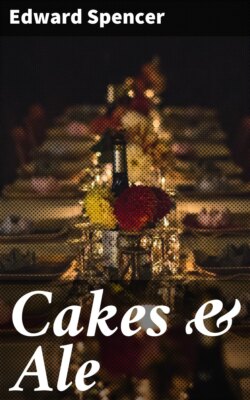Читать книгу Cakes & Ale - Spencer Edward - Страница 32
На сайте Литреса книга снята с продажи.
LUNCHEON
ОглавлениеTable of Contents
“’Tis a custom
More honoured in the breach than the observance.”
Why lunch?—Sir Henry Thompson on overdoing it—The children’s dinner—City lunches—Ye Olde Cheshyre Cheese—Doctor Johnson—Ye pudding—A great fall in food—A snipe pudding—Skirt, not rump steak—Lancashire hot pot—A Cape “brady.”
“‘More honoured in the breach,’ do you say, Mr. Author?” I fancy I hear some reader inquire. “Are these your sentiments? Do you really mean them?” Well, perhaps, they ought to be qualified. Unless a man breakfast very early, and dine very late, he cannot do himself much good by eating a square meal at 1.30 or 2.0 P.M. There can be no question but that whilst thousands of the lieges—despite soup-kitchens, workhouses, and gaols—perish of absolute starvation, as many of their more fortunate brethren perish, in the course of time, from gluttony, from falling down (sometimes literally) and worshipping the Belly-god.
Years ago Sir Henry Thompson observed to a friend of the writer’s:
“Most men who seek my advice are suffering under one of two great evils—eating too much good food, or drinking too much bad liquor; and occasionally they suffer under both evils.”
“This luncheon,” writes Oliver Wendell Holmes, “is a very convenient affair; it does not require any special dress; it is informal; and can be light or heavy as one chooses.”
The American—the male American at all events—takes far more count of luncheon than of breakfast.
But in many cases luncheon and early dinner are synonymous terms. Take the family luncheon, for instance, of the middle classes, where mother, governess, and little ones all assemble in front of the roast and boiled, at the principal meal of the day, and the more or less snowy tablecloth is duly anointed with gravy by “poor baby,” in her high chair, and the youngest but one is slapped at intervals by his instructress, for using his knife for the peas—at the risk of enlarging his mouth—or for swallowing the stones of the cherries which have been dealt him, or her, from the tart. This is not the sort of meal for the male friend of the family to “drop in” at, if he value the lapels of his new frock-coat, and be given to blushing. For children have not only an evil habit of “pawing” the visitor with jammy fingers, but occasionally narrate somewhat “risky” anecdotes. And a child’s ideas of the Christian religion, nay, of the Creator himself, are occasionally more quaint than reverent.
“Ma, dear,” once lisped a sweet little thing of six, “what doth God have for hith dinner?”
“S-sh-sh, my child!” replied the horrified mother, “you must not ask such dreadful questions. God doesn’t want any dinner, remember that.”
“Oh-h-h!” continued the unabashed and dissatisfied enfant terrible. And, after a pause, “then I thuppose he hath an egg with hith tea.”
In a country-house, of course, but few of the male guests turn up at the domestic luncheon, being otherwise engaged in killing something, or in trying to kill something, or in that sport which is but partially understood out of Great Britain—the pursuit of an evil-savoured animal who is practically worthless to civilisation after his capture and death.
It is in “the City” that vile man, perhaps, puts in his best work as an eater of luncheons. Some city men there be, of course—poor, wretched, half-starved clerks, whose state nobody ever seems to attempt to ameliorate—whose midday refections are not such as would have earned a meed of commendation from the late Vitellius, or from the late Colonel North. For said refections but seldom consist of more important items than a thick slice of bread and a stale bloater; or possibly a home-made sandwich of bread and Dutch cheese—the whole washed down with a tumbler of milk, or more often a tumbler of the fluid supplied by the New River Company. During the winter months a pennyworth of roasted chestnuts supplies a filling, though indigestible meal to many a man whose employer is swilling turtle at Birch’s or at the big house in Leadenhall Street, and who is compelled, by the exigencies of custom, to wear a decent black coat and some sort of tall hat when on his way to and from “business.”
But the more fortunate citizens—how do they “do themselves” at luncheon? For some there is the cheap soup-house, or the chop-and-steak house reviled of Dickens, and but little changed since the time of the great novelist. Then, for the “gilt-edged” division there is
